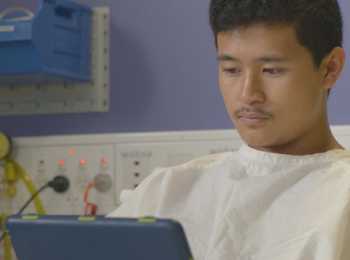Talking about cancer
Cancer can be hard for anyone to talk about. Your parent might find it difficult to know how to talk about their diagnosis or treatment with the family, they might be worried about upsetting you or even themself.
How your family talks about cancer can depend on how your family has communicated or related to each other before cancer entered your lives. Cancer is unlikely to suddenly change this, but we do know that trying to find new ways of talking together within families can be helpful when tough problems like cancer enter a family’s life.
If you are a young person who hasn’t previously wanted to ask a lot of questions about their parent or how they are going, it may be that your parent is assuming this hasn’t changed for you with them now having cancer. Asking questions can be tough, but it could be a signal to your parent that you are wanting to know more about what is happening for them. If this is something you find tough, we hope that it becomes something you can start at least trying to do.
These talking tips may be helpful for you and your parent:
Tips for talking about cancer
- Think about what you want to ask and what you want to say before you start. You could even write it down and then read it out.
- It may feel hard and uncomfortable at first and there may be some awkwardness. It could be helpful to try to sit with this and remind yourself in the moment that it’s normal.
- Send a text message or email letting them know that you’d like to talk, there may be a best time for this to happen.
- If it’s getting too hard to talk, it could be helpful to not feel that you must bring up everything in the one conversation. It is normal that you and your parent could cry or show other emotional responses in the conversation, you may need to take breaks.
- Checking in with each other at points in the conversation can be helpful to see if the person is happy to continue talking, hopefully your parent can help guide this.
- Do something at the same time as talking, e.g. going for a walk together or doing something that you like doing together, like watching TV. This can sometimes take some of the pressure out of stressful conversations.
- It could be hard to do in the moment but try not to worry too much about saying the wrong thing. It can take time to work out the best way to talk to each other.
But what if talking is too hard?
Sometimes talking is too hard. Maybe it’s not the right time or you don’t know what to say. If you still want your parent to know how you’re feeling, you can:
- send a text message, email, or letter
- share songs that say it for you
- Send a text message or email letting them know that you’d like to talk, there may be a best time for this to happen.
- find quotes or cards that say what you might be feeling
- draw pictures, write, or play music
- keep a journal; it can be private, or you can share it with your family.
If you or your family can’t talk about cancer, it may help to speak to a support service or person like a Canteen team member or family counsellor. They could help by giving you ideas on how to communicate with each other, this could particularly be helpful where there has been a lot of difficulty before now in your family relationships.
Contact Canteen for information about our counselling services, which includes parent support that can help parents problem solve how to talk to their children about cancer. If the communication problem feels too large, it could be that searching for a family-specific psychologist or therapist in your local area could be important for your family to start getting more specialist help.
Your parent has got what? Who to tell
Deciding who needs to know and what to say to people can be difficult. You might be worried about how they will react.
It’s up to you and your family who you tell about your parent’s cancer and how much to share. The truth is that some side effects to cancer treatment (e.g. hair loss) may make it hard not to tell others.
Reasons why it might be helpful to tell:
- You may need to take time off from study and work to be with your parent.
- It could help for other people to know what is happening to offer their support to the family, they may be helpful in ways that you weren’t aware of before speaking to them.
- Send a text message or email letting them know that you’d like to talk, there may be a best time for this to happen.
- Due to stress, worry, or extra responsibility, your energy levels may be lower than usual. If you’re unable to do the same level of things you used to like catching up with friends, it could help to let people know to keep up these connections.
- There is a lot of evidence behind the benefit of sharing experiences with other people and trying to talk openly about emotions.
Reasons why it may not feel right to tell:
- You feel embarrassed talking about your parent having cancer, especially if it affects private parts of their body (such as breasts or testicles).
- You don’t want to repeat the same story and answer the same questions over and over.
- You may feel conversations about cancer already dominate your life, maybe school is one of the only places where you don’t have to talk about your parent’s cancer.
It is completely up to you and your family who you tell and why.
Who do you have to tell?
There is no law in Australia that says you must tell your school, university, or TAFE (or workplace). However, it might help in certain circumstances to let people know. For example, if you’re finding it hard to concentrate or not keeping up with homework or assignments, you can ask your teachers or student centre for adjustments to your learning, they may be able to extend assignment dates or allow for longer exam times. In schools, this is usually called applying for Special Considerations to make allowances for your study requirements.
You may want to plan what you want to say. Try to anticipate questions that might be asked and how you might answer them. You don’t have to give specific details if you prefer not to, they may ask for a letter from a doctor or medical certificate if you are applying for special circumstances a form will likely need to be completed.
You could also ask your parent or another family member to tell friends or teachers for you if you don’t want to tell them yourself. Make sure the friends and teachers understand if you want them to keep the information private.
If you’re working, telling your boss or the human resources (HR) manager can make it easier to take time off if you need to go with your parents to treatment. The ways an employer may be willing to support you could be reducing work hours or allowing flexible work arrangements, including working remotely. It is worth knowing that some workplaces will only be flexible to a limited degree.
Send an email if you don’t know your teachers, lecturers, or bosses very well; this may make it easier to inform people and there becomes more an information record. You can use the email templates on Canteen Connect.
Sharing on social media
Some people use social media to let people know their parent has cancer. On the upside, this can be a fast way to tell lots of people and means you don’t have to say the same thing over and over. On the downside, once your post is ‘out there’, it could be shared widely, and people may make comments you find unhelpful. You may decide to share in closed/private groups.


















